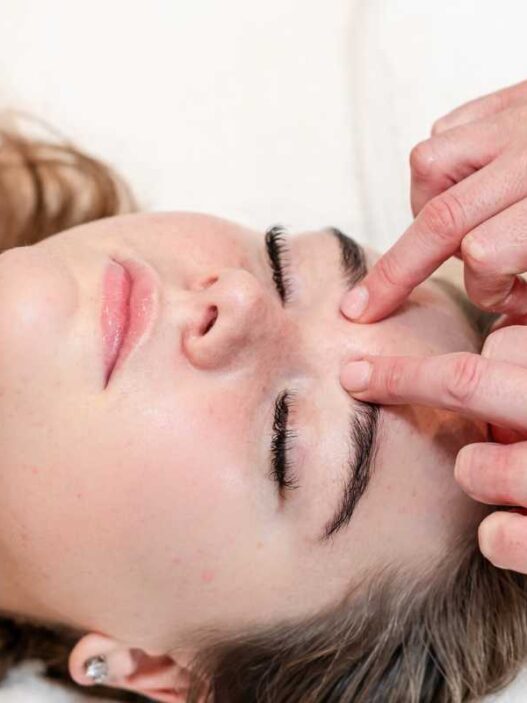Dr Julie Hall provides practical advice for understanding and providing a plan for helping women thrive at work throughout the menopause.
Meet Sarah – marketing manager, team leader, and all-round superwoman in her late forties. She’s always been the one juggling projects like a pro and keeping everyone motivated at work. Whilst at the same time, running a home, looking after two children (and dog) together with shopping and cleaning for her elderly in-laws.
Over the past year though, things have felt different. The hot flushes during meetings are uncomfortable and sometimes embarrassing. Her usually sharp focus feels foggy, and she’s struggling to concentrate in ways she never has before. Night sweats are disrupting her sleep, leaving her exhausted. What’s been harder to handle are the waves of anxiety that seem to come from nowhere, and periods where she feels unexpectedly low and tearful – emotions that feel completely out of character for someone who’s always been resilient and upbeat.
Sarah’s realising that these changes are all connected to perimenopause, and she’s not alone. Women all over the UK are experiencing their own versions of these symptoms.
However, the encouraging news is that with the right understanding, support and treatment, it is possible to find effective ways to help manage symptoms while continuing to ‘crack on’ at work.
Understanding the Numbers
Let’s look at what research is telling us.
Studies show that 99% of women notice some impact on their work life during perimenopause and menopause.
About 28% of women have adjusted their working patterns, and 10% have felt the need to change jobs. These figures highlight exactly where we need to focus our efforts to create better outcomes.
What’s particularly revealing is that 47% of women who take time off for menopausal symptoms don’t tell their employers the real reason. This suggests there’s still reluctance to discuss menopause openly in many workplaces.
Managing Symptoms in the Workplace
Menopause typically occurs between ages 45-55, often coinciding with peak career years when women may be in senior positions, leading teams, or advancing toward leadership roles. The hormonal changes can bring a range of symptoms – hot flushes, night sweats, mood changes, anxiety, depression, difficulty concentrating, memory issues…the list goes on… and they can feel challenging when they occur in professional settings.
Why Women Are Walking Away
The decision to leave a job or reduce working hours isn’t made lightly. For many women, it represents the collapse of years of career building and financial planning. Research shows that 59% had taken time off work due to their symptoms, with 18% off for more than eight weeks.
When workplaces fail to provide adequate support, women face impossible choices. They may reduce their hours to cope, impacting their income and pension contributions at a crucial time. Others change roles to less demanding positions, effectively stepping backward in their careers. Some leave the workforce entirely, representing a catastrophic loss of experience, skills, and institutional knowledge for employers.
The healthcare sector, where 77% of NHS workforce are women and a significant number of these will be perimenopausal and menopausal, faces particular challenges. Remarkably, only 1 in 10 female GPs had discussed their symptoms with a manager, highlighting how even healthcare professionals struggle to address menopause in their own workplaces.
So, what can you do?
If you’re experiencing menopausal symptoms at work, there are evidence-based strategies and practical adjustments that can make a significant difference to your comfort and confidence:
Speak to your doctor:
This is your most important first step. Symptoms can be assessed and management options discussed.
Lifestyle advice is paramount.
Hormone Replacement Therapy (HRT) can be transformative, effectively reducing symptoms and helping restore a sense of wellbeing. For women who can’t have (or don’t want) HRT, other medications and management options can be explored.
Don’t accept dismissive responses about symptoms being “just part of aging” – you deserve proper medical evaluation and treatment options. You are worth it!
Dress strategically:
Keep lightweight, breathable layers at your workspace that you can easily adjust. Natural fabrics like cotton and linen can help with temperature regulation. A small desk fan can provide immediate relief during hot flushes and is a simple, practical solution.
Stay well-hydrated:
Have a large water bottle at your desk and drink regularly throughout the day. This helps with hot flushes and supports cognitive function. Some women find that moderating caffeine intake or avoiding spicy foods can help reduce symptom frequency.
Optimise your workspace:
If possible, position yourself near windows for natural air circulation, or close to temperature controls.
Work with your natural rhythms:
Pay attention to when you feel mentally sharpest and try to schedule important tasks during these times to maximize your engagement and productivity.
Build in regular breaks:
Short walks, even around the building, can really help with energy levels, and temperature control. Fresh air and movement are particularly beneficial for managing anxiety and low mood. If you’re drinking plenty of water as advised above, these little walks will come naturally.
Understand your workplace rights:
Under the Equality Act 2010, employers have legal obligations to make reasonable adjustments for employees experiencing menopause. This might include flexible working arrangements, modifications to dress codes, workspace temperature adjustments, or time off for medical appointments.
Track your symptoms:
Keep a simple diary noting when symptoms are better or worse. This information is valuable for identifying triggers and patterns and provides useful data when discussing treatment options with your GP or workplace adjustments with your employer.
Talk to your colleagues:
Many workplaces now have a menopause champion or offer menopause support groups. If yours doesn’t, consider suggesting one. Online communities can provide valuable practical advice and emotional support from women with shared experiences.
Consider speaking to your manager:
While it’s entirely your choice whether to discuss menopause with your employer, having open conversations can often lead to helpful adjustments. You might approach HR or a trusted manager to discuss what workplace support could help you maintain your performance. Remember that under the Equality Act 2010, your employer has legal obligations to consider reasonable adjustments.
Speak up for yourself:
You understand your needs best. Whether it’s requesting a different meeting room rather than the one that’s like a sauna, asking for flexible start times to accommodate disrupted sleep, or discussing other adjustments, clear communication about your needs often leads to positive solutions.
Positive Changes in Workplace Culture
There’s encouraging progress happening across UK workplaces as employers recognise that supporting women through menopause makes both ethical and business sense. Organisations are understanding that women in their forties and fifties represent decades of valuable experience, institutional knowledge, and professional expertise that benefits their entire workforce.
Progressive employers are implementing comprehensive menopause policies that include flexible working arrangements, improved environmental controls, access to quiet spaces for breaks, and supportive leave policies for medical appointments. Some organisations are extending this support further by providing specialised health insurance coverage or bringing in menopause specialists for employee education and support.
Management training is becoming increasingly common, helping team leaders develop the knowledge and confidence to have supportive conversations about menopause and understand what workplace adjustments might be beneficial. When women feel understood and supported, research shows they demonstrate higher job satisfaction, increased loyalty, and continued high performance. It just makes good business sense!
Looking Ahead with Confidence
The whole conversation around menopause awareness is changing – and about time.
As doctors working in this area, it is so rewarding to hear from women who’ve come out the other side of this transition and say they feel more confident and capable than ever.
Some even report that their post-menopause years have been their most productive and satisfying workwise.
It’s important to remember that you’re part of one of the most educated and experienced generations of women in history.
The expertise, perspective, and professional skills you bring to your workplace remain tremendously valuable.
With growing awareness, improved medical treatments, and increasingly supportive workplace cultures, there are solid reasons for optimism about thriving professionally during and after the menopause journey and you don’t need to navigate it alone.

Dr Julie Hall
Her Health Hub
If your organisation would benefit from bespoke education, you can find Her Health Hub on the Women’s Health Club Health and Wellbeing Directory here.




















